Raw, fresh foods are so popular and for good reason! After all, many raw foods are packed with vitamins and nutrients that give you energy and fuel your body. Some foods, however, are best consumed cooked and can actually be poisonous or harmful to your health if eaten raw. Some foods, like raw meat, may be obvious to avoid eating raw, but others you might be surprised about. It’s important to be aware of these foods and ensure they’re always cooked before you consume them.
Red Kidney Beans
Raw kidney beans can be incredibly toxic if not cooked or undercooked before consuming. These raw beans contain high levels of the toxin phytohemagglutinin, which can cause severe stomach upset. This toxin can cause gastrointestinal discomfort and symptoms similar to food poisoning within just a few hours of consuming, and from as few as four raw kidney beans.
This reaction can also occur if the beans are cooked for too little amount of time. It’s recommended to boil kidney beans for at least ten minutes before eating them.
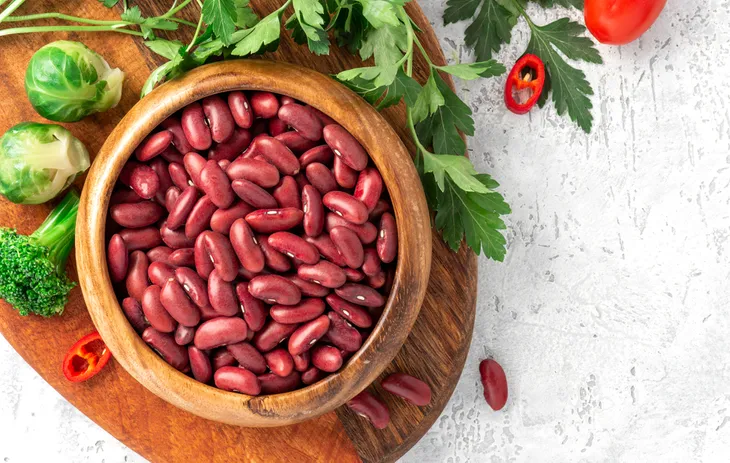 Shutterstock/Svetlana Monyakova
Shutterstock/Svetlana MonyakovaEggs
You were likely told as a child to never eat an egg raw, and for good reason! Eggs shouldn’t be eaten raw because of potential contamination from Salmonella bacteria.
Symptoms of salmonella food poisoning include stomach cramps, diarrhea, vomiting, and fever. These symptoms may last four to seven-days after eating the contaminated food. To avoid any of this discomfort, it’s best to ensure your eggs are cooked to a safe temperature to ensure any bacteria is removed.
 Shutterstock/Sea Wave
Shutterstock/Sea WavePotatoes
It’s important to always cook your potatoes before consuming to avoid some serious digestive issues. The uncooked starch of potatoes can lead to bloating, gas, and nausea. To avoid any gastrointestinal discomfort, it’s recommended to bake, sauté, or cook your potatoes before consumption.
You should also keep your eye on the color of your raw potatoes before cook, especially if they’ve spent some time in a warm or damp area. If you notice any green spots on the potatoes, you should avoid eating altogether. This could be a toxin called solanine which can cause food poisoning.
 Shutterstock/Val_R
Shutterstock/Val_RChicken
Chicken is one of the top foods that can lead to food poisoning. It’s always best to consume chicken fully cooked since eating raw chicken only increases your risk for salmonella and campylobacter bacteria. The CDC recommends cooking chicken to an internal temperature of 165°F.
While it may be common knowledge to never consume chicken raw, there are some restaurants serving it this way in the form of a dish called torisashi, or chicken sashimi. This dish is typically seared for no longer than 10 seconds, which is not enough time or heat to destroy harmful bacteria.
 Shutterstock/vkuslandia
Shutterstock/vkuslandiaBitter Almonds
There are so many health reasons to consume almonds, but it’s best to avoid one particular type of almonds: bitter almonds. The kind of almond you’re likely most familiar with in the United States is “sweet almonds,” but this bitter almond variety is prevalent in Europe.
Bitter almonds contain hydrocyanic acid, which is a dangerous combination of hydrogen cyanide and water. These almonds are safe to eat cooked, but can cause toxic effects if consumed raw.
 Shutterstock/Owl_photographer
Shutterstock/Owl_photographerGround Beef
It’s best to avoid eating raw beef, especially so considering the risk of E. coli infection. E.coli bacteria can survive in freezing temperatures, so its essential that beef be cooked to a temperature high enough to destroy it, which the USDA considers at 160°F.
Steak tartare is a common dish in French, American and even Mongolian cuisine, but is it safe? The USDA recommends cooking all meat, but if fresh meat is used and basic hygienic rules are followed, the risk of bacterial infection is low. It’s recommended that you ensure the butcher and restaurant has taken meticulous steps to properly store and prepare the dish to avoid risk of contamination.
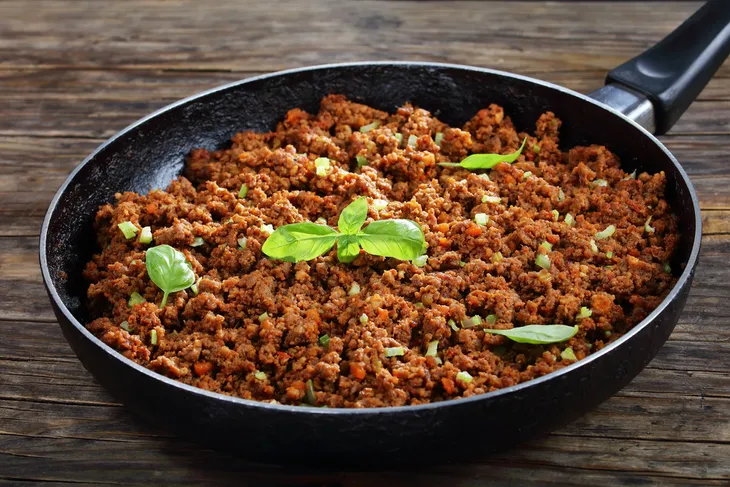 Shutterstock/from my point of view
Shutterstock/from my point of viewOlives
The olives you’re used to consuming have been cured and marinated, which give them their delicious flavor and salty quality. Raw olives that are straight from a tree, however, have an extremely bitter taste and won’t resemble the olives you’re used to.
While it’s not necessarily dangerous to consume olives raw, they are extremely bitter and typically not enjoyable to eat. This one is more so about taste and sanitary preference rather than a fear of bacteria or toxin contamination.
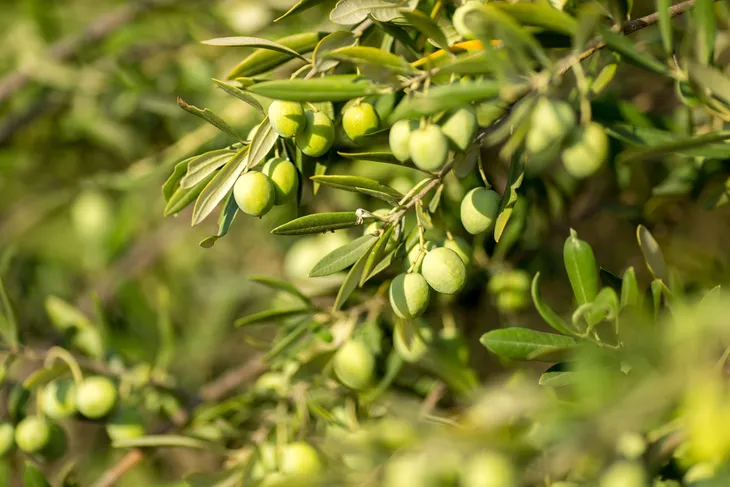 Shutterstock/Maria Guryanova
Shutterstock/Maria GuryanovaWild Mushrooms
Mushrooms offer a huge array of benefits including antioxidants, vitamin B and potassium. While certain mushrooms can be consumed raw, it is typically best to consume them cooked to get the most nutrients out of them. Roasted, sautéed or grilled mushrooms have more potassium content than uncooked mushrooms.
Raw mushrooms also tend to be difficult to digest and taste better sautéed with spices regardless, so it’s best to consume them cooked. Wild mushrooms, on the other hand, can have more serious effects if consumed uncooked and can even have a carcinogenic or toxic effect on the body.
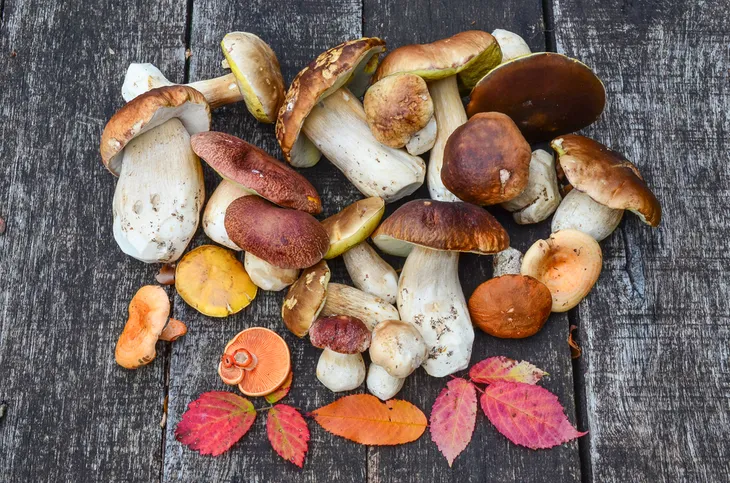 Shutterstock/AleksandarMilutinovic
Shutterstock/AleksandarMilutinovicEggplant
Similar to raw potatoes, uncooked eggplant has the same glycoalkaloid compound, solanine, which is not ideal to eat raw. Eggplants that were harvested early in their plant lives, in particular, contain the highest levels of this toxin.
To avoid any of these unpleasant gastrointestinal effects, it’s best to cook your eggplant before consuming. Another factor to be aware of is that some people may have allergic reactions to even the smallest amounts of raw eggplant.
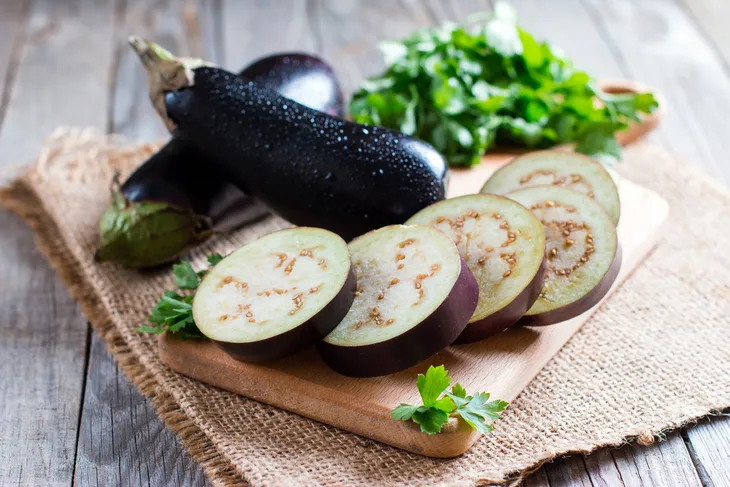 Shutterstock/Ahanov Michael
Shutterstock/Ahanov MichaelPork
Both raw pork and undercooked pork are unsafe to eat, according to WebMD. Raw pork sometimes contains bacteria and parasites that can make you ill. Cooking your pork will avoid any contamination issues and destroy any germs that might be present.
It’s recommended to cook your pork to a safe minimum internal temperature, which is 145°F, and then allow it to rest for three minutes. Safe storing, preparing, and cooking practices can lower your chances of contracting any harmful bacteria.
 Shutterstock/klaikungwon
Shutterstock/klaikungwonElderberries
Berries are often known as a superfood and have amazing benefits for your body such as boosting your immune system and providing antioxidants. Certain berries, such as elderberries, should not be eaten raw though.
Elderberries in raw form can be poisonous and can lead to nausea, vomiting, and diarrhea. To safely consume elderberries, it’s recommended to boil them thoroughly. In this form they can be used as a natural syrup to treat the cold or a flu. Elderberries can also be used as a skincare ingredient to calm acne and irritated skin.
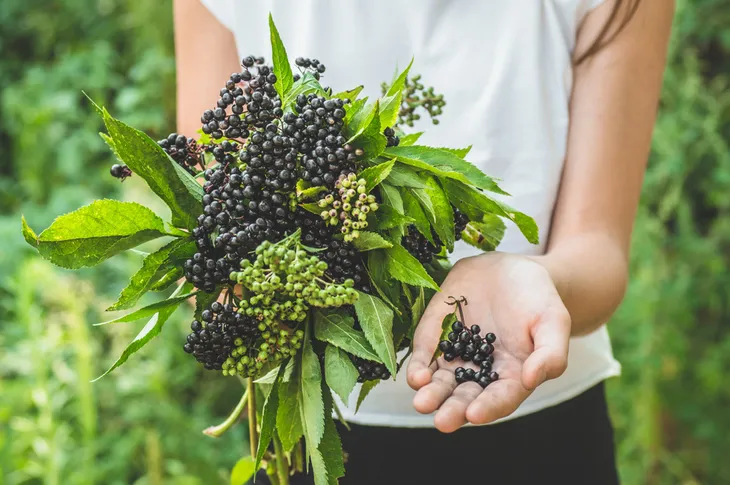 Shutterstock/Nastyaofly
Shutterstock/NastyaoflyLima Beans
Lima beans are another bean you should avoid eating raw, for similar reasons that you should avoid eating bitter almonds. They contain a compound called linamarin, which breaks down into cyanide.
Products that contain a derivative of cyanide should always be baked or roasted to improve taste and for optimum safety. Luckily, cooking lima beans for just 10 to 20-minutes makes them perfectly safe and harmless to consume. You should also try to cook them uncovered to allow for the cyanide to escape as gas.
 Shutterstock/Alvaro German Vilela
Shutterstock/Alvaro German Vilela


